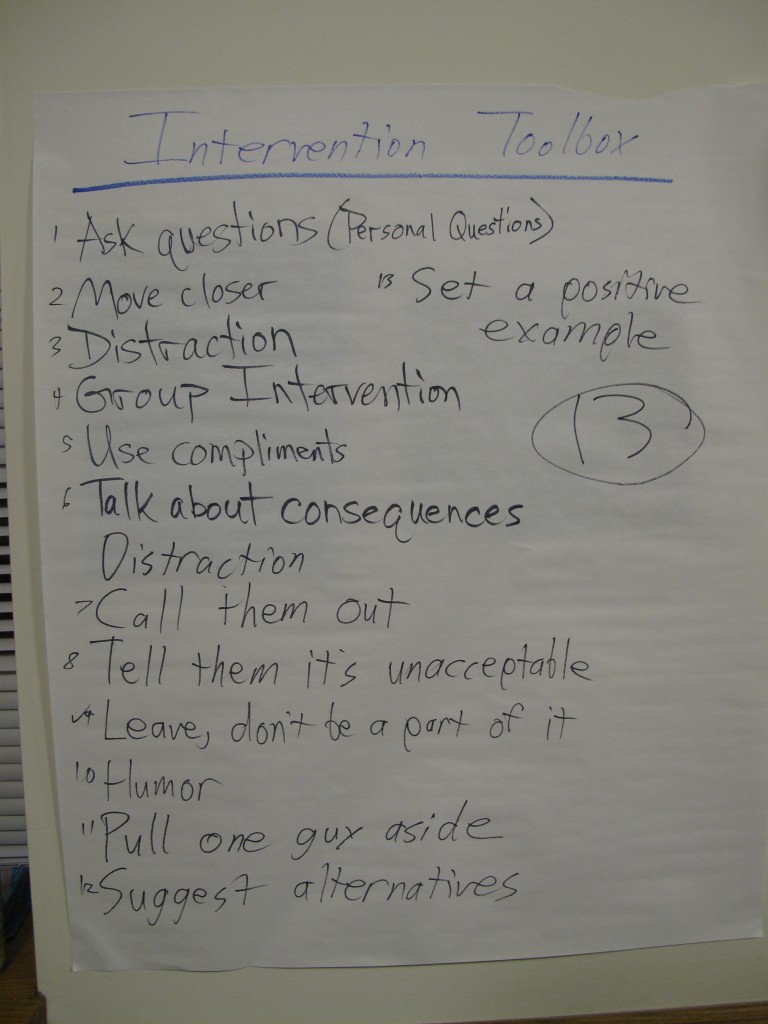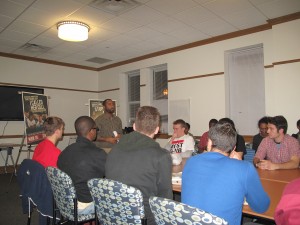 I love the work that Men Can Stop Rape (MCSR) does to challenge harmful definitions of masculinity and to empower men to be allies with women in ending gender violence. Their latest project is a new campus bystander campaign called Where Do You Stand? aimed at men.
I love the work that Men Can Stop Rape (MCSR) does to challenge harmful definitions of masculinity and to empower men to be allies with women in ending gender violence. Their latest project is a new campus bystander campaign called Where Do You Stand? aimed at men.
This comprehensive campaign uses billboards, posters, T-shirts, bystander intervention trainings, and peer-education sessions to equip young men with the necessary skills and tools to intervene when they see a situation that doesn’t look right, including street harassment.
On January 31, they officially launched the campaign during an MCSR bystander training for about 30 young men at Georgetown University in Washington, DC. I attended and spoke at the beginning for a few minutes.
The main portion of the workshop was role playing and brainstorming responses to scenarios.
 They also talked about barriers that prevent bystanders from intervening and brainstormed a list of methods for intervening, such as providing a distraction or addressing the harasser head on (see a photo of the list they created).
They also talked about barriers that prevent bystanders from intervening and brainstormed a list of methods for intervening, such as providing a distraction or addressing the harasser head on (see a photo of the list they created).
The first few scenarios they discussed focused on intervening in questionable situations at college parties. The last example on street harassment kept me furiously scribbling notes.
One of the facilitators described a group of men standing on a corner near a building, street harassing women going by. He asked the young men how many of them had seen that happen before and more than half of them raised their hand. Then he asked the for their ideas for dealing with this scenario. Here are some of them:
1. Say, “Yo, chill son,” to slightly call them out on the behavior.
2. Directly point out what they’re doing and say, “This is unacceptable.”
3. Use public ridicule to call them out or silence them…though a few young men pointed out that is okay if you know the harassers, but if you don’t and you call them out like that, you may “get whooped.”
4. If it’s your group of friends, tell them, “That’s not cool,” and if they keep it up, say you’re out and walk away. Chances are they’ll back down then. Another guy similarly suggested saying, “If this is how you’re going to spend your night, I’m leaving. This is not okay.”
5. Reverse catcalling the men can be effective. They don’t know how to respond or what to do.
6. If it’s a friend doing it, tell him that it’s not the right approach to take but to be the respectful gentlemen he is if he wants to meet someone.
 Some other interesting things the young men said:
Some other interesting things the young men said:
* Guys who catcall wouldn’t be my friends because that’s the rudest thing they can do and I’m not okay with that.
* Men catcall because there are other men around. It’s a way to demonstrate their masculinity while riding with your crew or walking down the street. So figure out why your friends feel they have to prove their masculinity to you and address that.
* If you establish yourself as a person who doesn’t laugh at catcalls, then it won’t happen around you because they won’t use that as a way to try to impress you.
* Intervening is hard, but once you do it, it will pay off. People will know you’re the guy who doesn’t like that behavior and others will call them out on it if they do it around you. Maybe they will still catcall when you aren’t around, but it’s a start. The benefits of intervening far outweigh the consequences.
I left the workshop pumped. I know there are plenty of men out there who want to help stop gender violence and harassment, but I’d never been in a room full of them before. It gives me hope! I hope you will share their bystander tips (and others from the Stop Street Harassment website) with friends and family. And if you’re on a college campus, consider bringing the Where Do You Stand? campaign to your school!
